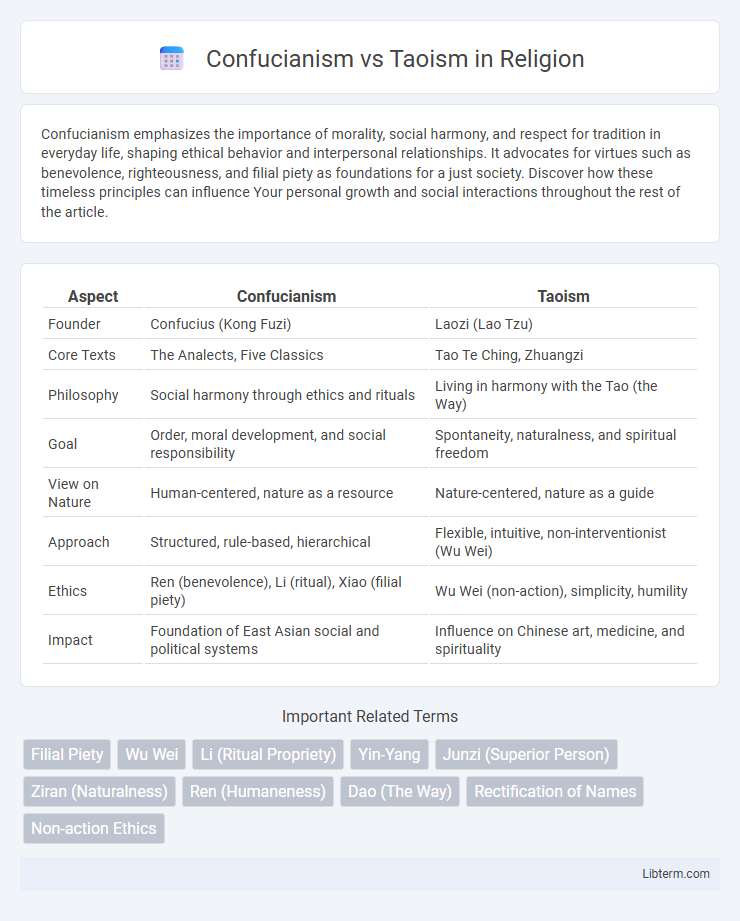Confucianism emphasizes the importance of morality, social harmony, and respect for tradition in everyday life, shaping ethical behavior and interpersonal relationships. It advocates for virtues such as benevolence, righteousness, and filial piety as foundations for a just society. Discover how these timeless principles can influence Your personal growth and social interactions throughout the rest of the article.
Table of Comparison
| Aspect | Confucianism | Taoism |
|---|---|---|
| Founder | Confucius (Kong Fuzi) | Laozi (Lao Tzu) |
| Core Texts | The Analects, Five Classics | Tao Te Ching, Zhuangzi |
| Philosophy | Social harmony through ethics and rituals | Living in harmony with the Tao (the Way) |
| Goal | Order, moral development, and social responsibility | Spontaneity, naturalness, and spiritual freedom |
| View on Nature | Human-centered, nature as a resource | Nature-centered, nature as a guide |
| Approach | Structured, rule-based, hierarchical | Flexible, intuitive, non-interventionist (Wu Wei) |
| Ethics | Ren (benevolence), Li (ritual), Xiao (filial piety) | Wu Wei (non-action), simplicity, humility |
| Impact | Foundation of East Asian social and political systems | Influence on Chinese art, medicine, and spirituality |
Introduction to Confucianism and Taoism
Confucianism centers on ethical teachings and social harmony, emphasizing filial piety, righteousness, and the importance of structured relationships to cultivate moral character. Taoism advocates living in harmony with the Tao, the fundamental principle underlying the universe, promoting simplicity, spontaneity, and non-action (wu wei) to align with the natural order. Both philosophies originated in ancient China, shaping cultural values, spiritual beliefs, and practices, yet Confucianism prioritizes societal roles, while Taoism focuses on individual alignment with nature.
Historical Origins and Development
Confucianism originated in the 6th century BCE during the Zhou Dynasty, founded by Confucius, emphasizing social harmony, ethical conduct, and hierarchical relationships. Taoism began around the same period, attributed to Laozi, focusing on living in harmony with the Tao (the Way), advocating simplicity, spontaneity, and natural order. Both philosophies evolved through seminal texts--The Analects for Confucianism and the Tao Te Ching for Taoism--shaping Chinese culture and influencing spiritual thought throughout East Asia.
Core Philosophical Foundations
Confucianism centers on the principles of social harmony, ethical conduct, and the importance of hierarchical relationships, emphasizing virtues like filial piety, righteousness, and humaneness. Taoism advocates for living in accordance with the Tao, or the natural way, promoting simplicity, spontaneity, and wu wei (non-action) to achieve balance and harmony with nature. Both philosophies offer distinct approaches to understanding existence, morality, and the ideal way of life, with Confucianism focusing on societal order and Taoism on individual alignment with the cosmos.
Key Figures and Texts
Confucianism centers on Confucius, whose Analects emphasize ethics, social harmony, and proper conduct, while key figures like Mencius further developed its moral philosophy. Taoism is grounded in the teachings of Laozi and Zhuangzi, with foundational texts such as the Tao Te Ching and Zhuangzi promoting naturalness, spontaneity, and harmony with the Tao (the Way). Both traditions offer distinct approaches to life and governance through their respective philosophical giants and seminal writings.
Views on Human Nature
Confucianism views human nature as inherently good but requires education and moral development to cultivate virtuous behavior, emphasizing social harmony and ethical duties. Taoism considers human nature to be naturally spontaneous and aligned with the Tao, advocating for simplicity and non-interference with the natural flow of life. Both philosophies highlight self-cultivation but differ in approach: Confucianism promotes structured social roles while Taoism encourages living in harmony with nature's spontaneity.
Ethics and Moral Values
Confucianism emphasizes structured social harmony through virtues like filial piety, righteousness, and ritual propriety, promoting a moral code rooted in duty and respect within familial and societal hierarchies. Taoism advocates for aligning with the Tao, the natural way, encouraging simplicity, spontaneity, and non-interference, which fosters ethical living through balance and humility rather than rigid rules. Both philosophies offer distinct moral frameworks: Confucianism centers on active cultivation of virtue and social responsibility, while Taoism stresses inner harmony and adapting to the flow of life.
Approaches to Society and Governance
Confucianism advocates for a structured society based on hierarchical relationships, moral education, and the importance of righteous leadership to maintain social order and harmony. Taoism emphasizes natural spontaneity, minimal intervention, and alignment with the Tao, promoting flexible governance that fosters individual freedom and balance in societal interactions. Confucianism supports active governance and ethical duties, whereas Taoism encourages laissez-faire leadership and living in harmony with the natural world.
Spiritual Practices and Rituals
Confucianism emphasizes structured rituals and ceremonies that reinforce social harmony, filial piety, and moral virtues, including ancestor worship and formal rites during festivals. Taoism centers on individual spiritual practices such as meditation, breath control, and inner alchemy aimed at aligning with the Tao, the fundamental principle underlying the universe. Both traditions incorporate sacred texts--Confucianism with the Analects and Taoism with the Tao Te Ching--that guide their respective ritualistic and spiritual disciplines.
Influence on East Asian Culture
Confucianism has profoundly shaped East Asian culture by emphasizing social harmony, filial piety, and hierarchical relationships, impacting education, governance, and family structures across China, Korea, and Japan. Taoism contributes a complementary influence through its focus on natural order, simplicity, and spiritual harmony, deeply affecting Chinese art, medicine, and religious practices. The interplay between Confucian ethics and Taoist philosophy continues to define cultural values, rituals, and worldviews throughout East Asia.
Modern Relevance and Adaptation
Confucianism remains influential in modern East Asian societies by promoting social harmony, ethical governance, and educational values that shape contemporary political and familial structures. Taoism adapts to modern contexts through its emphasis on natural living, environmental sustainability, and holistic health practices such as Tai Chi and acupuncture. Both philosophies contribute to contemporary discussions on balance between individual well-being and societal order, reflecting their enduring relevance in addressing modern ethical and ecological challenges.
Confucianism Infographic

 libterm.com
libterm.com